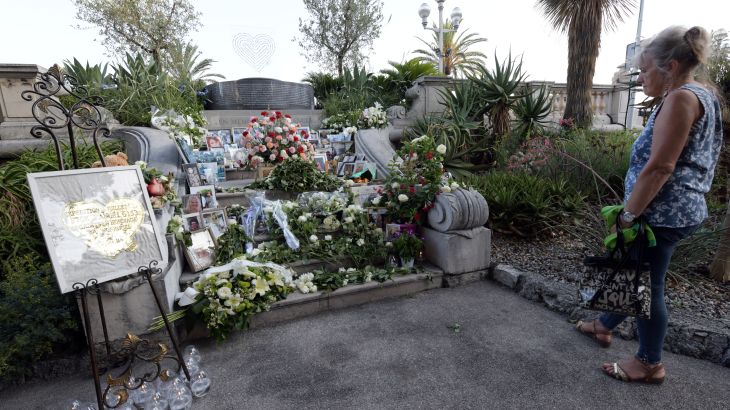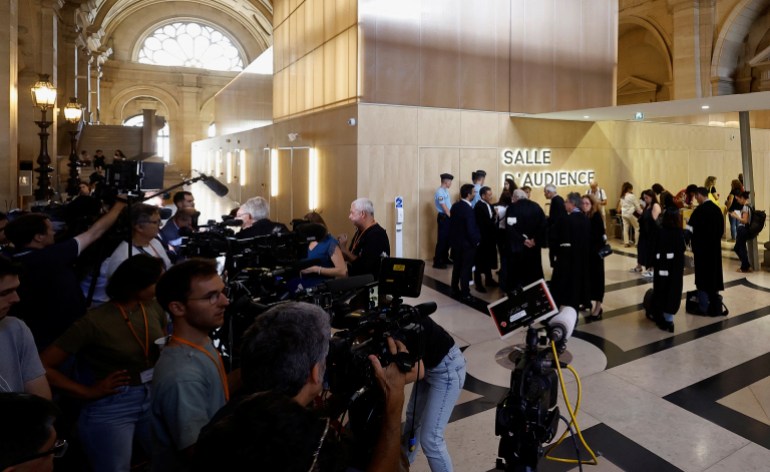French court sentences eight for 2016 truck attack in Nice
Two out of the eight convicted were given 18 years behind bars for helping Mohamed Lahouaiej-Bouhlel kill 86 people.

A court in France has handed down prison terms to eight people charged for the terror attack in Nice in 2016, where a man rammed his truck into a crowd celebrating the July 14 national holiday.
Two men were given the most severe sentence of 18 years behind bars on Tuesday for helping Mohamed Lahouaiej-Bouhlel, a 31-year-old Tunisian resident, prepare the attack that killed 86 people and injured more than 450 in a four-minute rampage on a seaside embankment in the southern city before being shot dead by police.
Keep reading
list of 3 itemsFrance charges four for attack on former Charlie Hebdo offices
French court finds Charlie Hebdo attack accomplices guilty
Judges determined that Mohamed Ghraieb and Chokri Chafroud must have known about the attacker’s turn to radicalism and his potential to carry out a terror attack, based on records of phone calls and text messages among the three in the days before the attack.
Ghraieb, a 47-year-old from the same Tunisian town as Lahouaiej-Bouhlel, and Chafroud, a 43-year-old Tunisian, were also accused of helping to rent the delivery truck.

They denied the charges. Ghraieb’s lawyer, Vincent Brengarth, said his client would appeal.
Ramzi Arefa, 28 – who has admitted to providing Lahouaiej-Bouhlel with the gun he fired at police without hitting anyone – was handed a 12-year term, though he was not accused of criminal association with a terrorist or of being aware of Lahouaiej-Bouhlel’s potential for launching an attack.
The Islamic State of Iraq and the Levant (ISIL, also known as ISIS) group later claimed Lahouaiej-Bouhlel as one of its followers. Investigators have not found any concrete links between the attacker and the armed group, who at the time controlled swaths of Iraq and Syria.
The five other suspects, a Tunisian and four Albanians, were sentenced to prison terms of two to eight years on charges of weapons trafficking or criminal conspiracy, but without any terrorism-related charges.
Brahim Tritrou was the only suspect tried in absentia after fleeing judicial supervision to Tunisia, where he is now believed to be under arrest.
‘A small victory’
The verdict followed more than three months of sometimes heart-wrenching testimony from survivors of the attack, who during the trial described the horror and carnage they witnessed that summer night and the effect it had on their lives.
Some 30,000 people had gathered on the Nice seafront to watch a fireworks display celebrating France’s annual Bastille Day holiday when Lahouaiej-Bouhlel began his attack.
According to French and Tunisian news reports, his body was repatriated to Tunisia in 2017 and buried in his hometown of M’saken, south of Tunis. This has never been confirmed by the Tunisian authorities.
France has been buffeted by a wave of assaults since the killings at the satirical Charlie Hebdo newspaper and a Jewish supermarket in Paris in January 2015, often by “lone wolf” attackers acting in the name of ISIL or other groups.
In October, a Paris appeals court upheld the life sentence of Ali Riza Polat, accused of helping to find the weapons for the Charlie Hebdo attackers.
The Nice trial took place at the historic Palais de Justice in Paris, in the same purpose-built courtroom that held the hearings for the November 2015 terror attacks in Paris that left 130 people dead.
A special venue was also set up in Nice to allow victims to follow proceedings via a live broadcast.
Survivors reacted positively to the verdict.
“I am satisfied to see that the two main defendants have been sentenced to 18 years in prison, even if it is nothing compared to what we have experienced,” said survivor Laurence Bray. “This verdict is a relief. Now, there will be a big void.”
“It won’t bring my family back, my mom, my son, but it’s a small victory that feels good,” Caroline Villani, another survivor, said.
For many others, the sentences sought by prosecutors failed to match the scope of the suffering.